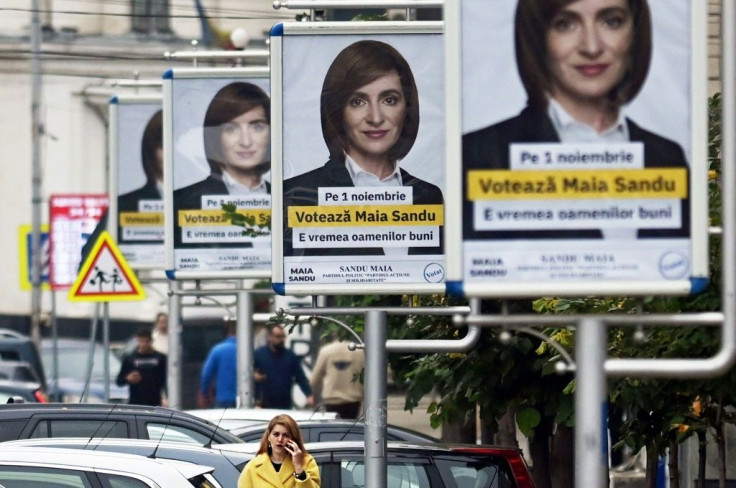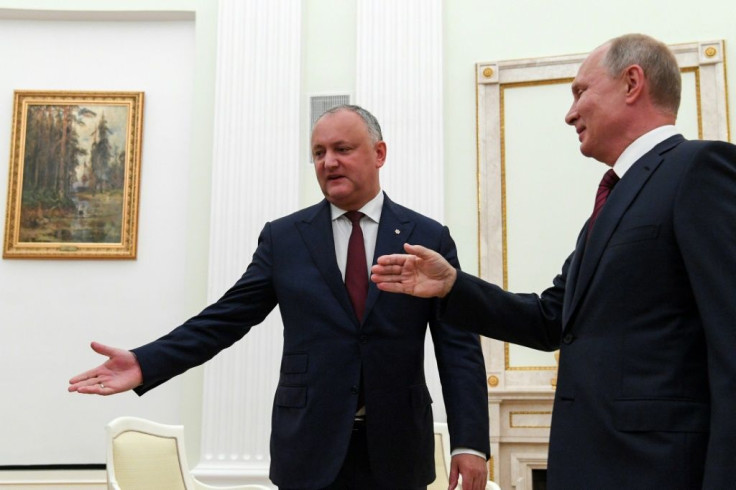Moldova Votes For President Under Moscow Gaze
Moldovans go to polls Sunday to elect a president under the watchful eye of Moscow which wants the polarised country to remain in its orbit amid political and security crises on Russia's borders.
Despite its small size, politics in tiny Moldova, which is wedged between Ukraine and NATO member Romania, have long been deeply sensitive.
The impoverished country of 3.5 million has been divided between those favouring closer ties with the EU, in particular Romania, and those who cling to Soviet-era relations with Moscow.
The country's pro-Moscow leader Igor Dodon came to power in 2016, beating his pro-Western rival Maia Sandu, who wants Moldova to join the European Union. He is now seeking a new four-year mandate in the November 1 polls, hoping to defeat Sandu again.
Russian President Vladimir Putin expressed hope last week that Moldovan voters would back Dodon, noting that their country's economy -- badly battered by the coronavirus outbreak -- is firmly linked to Russia.
"We see what is happening around Moldova, and know the Moldovan people's need to both develop democracy and economy," the Russian president said.
Valeriu Pasa, an analyst with WatchDog Moldova, a think tank, said Moscow is keen to maintain the status quo in Moldova. "The current regime is fully subordinate to the Kremlin," Pasa told AFP.

Dodon, who served as economy minister under a communist government between 2006 and 2009, has promised continued close ties with Moldova's "strategic partner" Russia and said the Russian language should once again become compulsory in schools.
Some find the former Socialist Party leader's programme unconvincing.
"As long as we vote for socialists, we will never get out of poverty," Ion Enache, 62, told AFP in the centre of Chisinau.
"We need a president whose heart beats in unison with that of the country."
Ekaterina Radetskaya, 69, disagreed, saying Dodon deserved a second chance.

"He's a good man and a good president," she told AFP, insisting that the 45-year-old leader had been prevented by opponents from fully implementing his programme.
Dodon's rival Sandu is a 48-year-old centre-right opposition candidate who briefly served as prime minister in June-November, 2019.
"I will promote a foreign policy that benefits Moldovans and move the country forward on the path of integration with the EU," she told her supporters in a video address on Facebook.
For Gheorghe Istrate, a 59-year-old resident of Chisinau, that is the right direction for a country that was part of the Soviet Union between 1940 and 1991.
"For 70 years we lived under the yoke of Russia which treated us as vassals," said Istrate who works at a bakery. "We've had enough."
Experts predict a second-round runoff as neither Dodon nor Sandu are expected to secure an outright majority on Sunday.
Besides the pair, six more candidates are contesting the vote.
Last week Russia accused the United States of preparing a "revolution" in Moldova, blaming Washington for similar interference in Belarus and Kyrgyzstan.
In a rare public statement, the head of Russia's Foreign Intelligence Service (SVR) Sergei Naryshkin alleged that Washington believed that Dodon was on course to win the polls and was inciting the Moldova opposition to take to the streets after the vote to denounce its validity and demand a re-run.
Sandu has said that weeks of protests in ex-Soviet Belarus. where the opposition accuses strongman Alexander Lukashenko of stealing a presidential election, should be a warning for Moldova.
Radetskaya, the pro-Dodon voter, said she was worried that Belarus-style opposition protests could break out in Moldova after the election.
"This can happen here too," she said.
© Copyright AFP {{Year}}. All rights reserved.



















